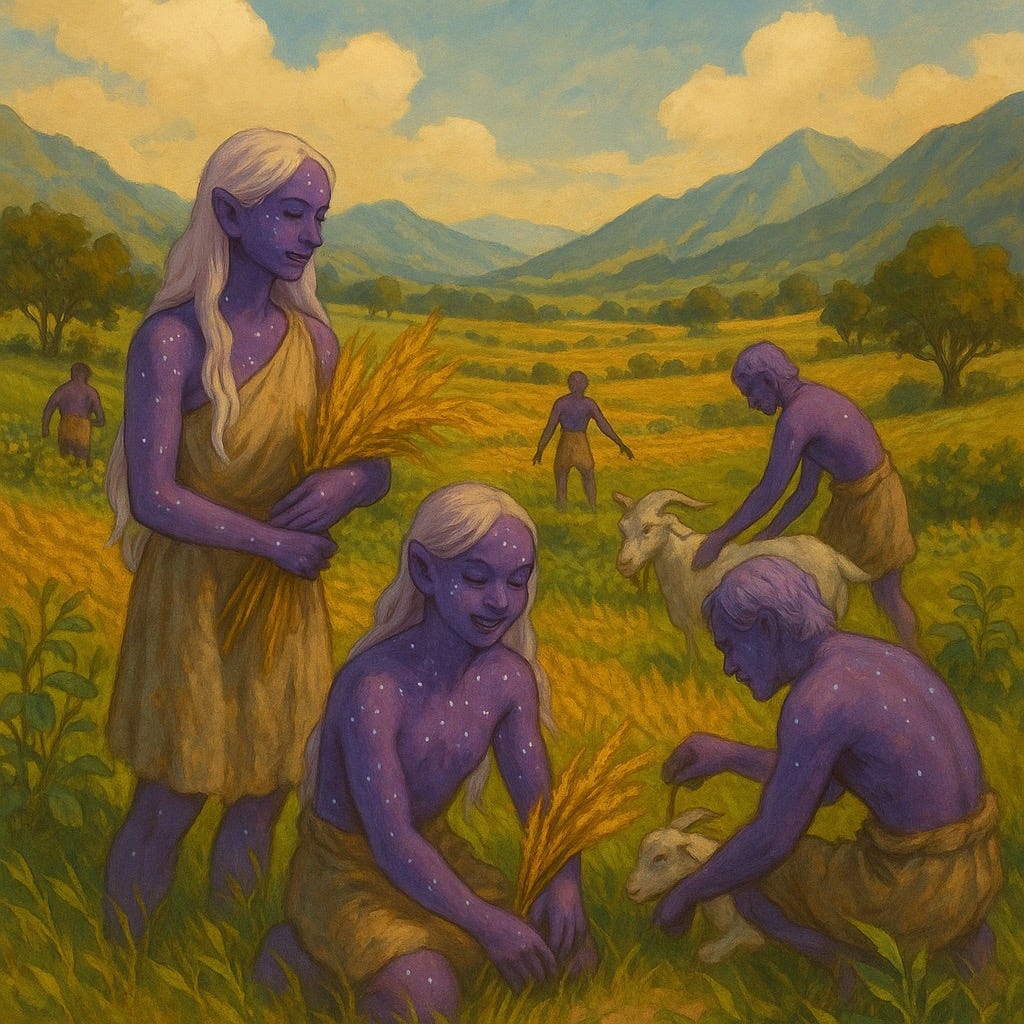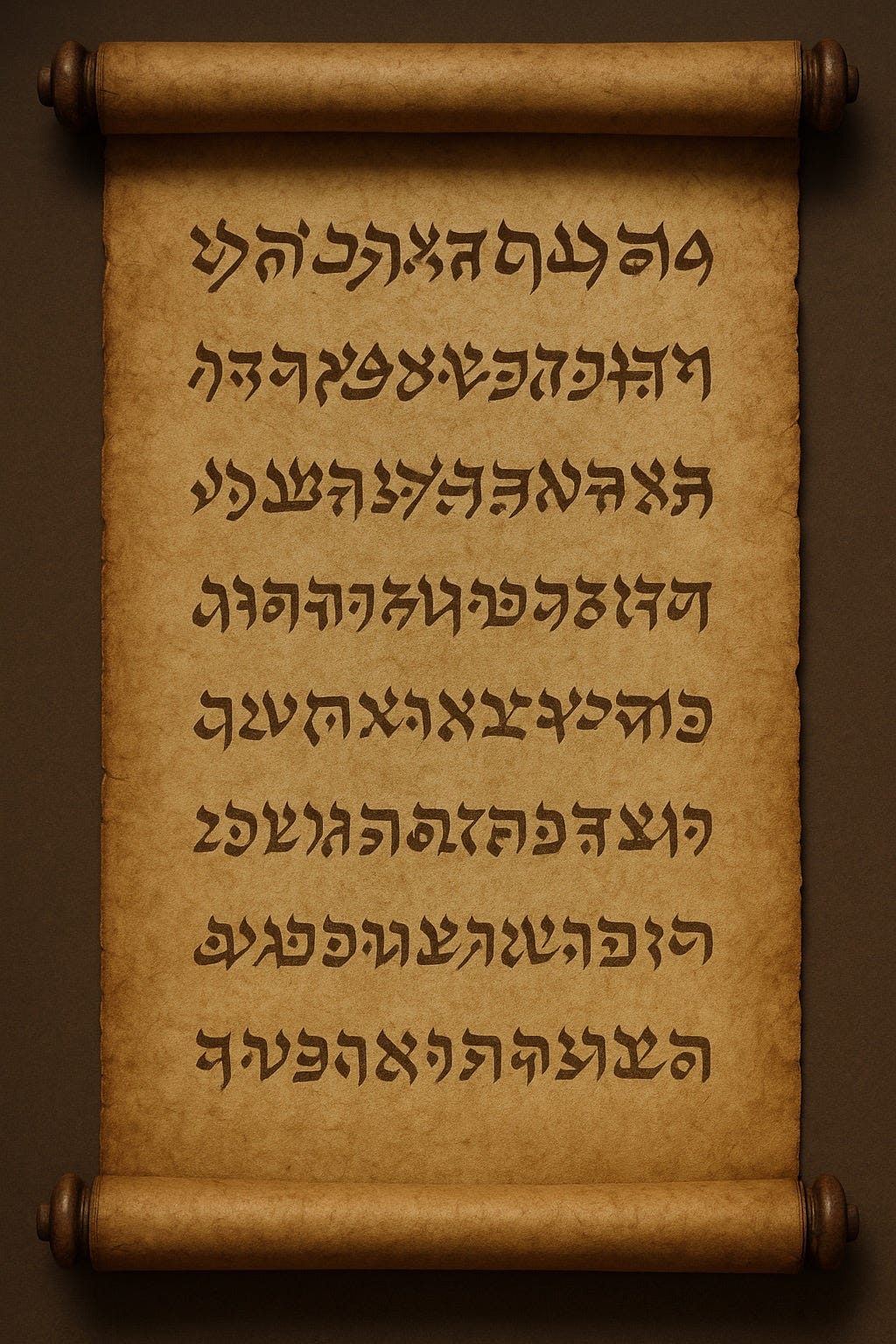What if they are the key to living the most fulfilling existence you can find, this side of eternity?
Before distortion entered the world, there was design.
In the earliest records of Kavareth’s sacred history, long before the fractures between Light and shadow, the Ordainments of Veya were given as the original order. These eight divine decrees formed the foundation of creation’s harmony, reflecting the nature of Veya Himself.
The Ordainments are not merely moral instruction. They are the breath-patterns of a world aligned with its Maker. To break them is not simply to disobey—it is to err, a term which in Veilish thought carries the weight of divine deviation.
This essay offers a theological and symbolic exploration of these Ordainments, their role in shaping Veyari purpose, and the devastating rise of the lunafel, whose pride marked the first distortion of sacred speech. With each law came its opposite, and each truth, a twisted echo.
What follows is not fixed doctrine, but a living document: a call to remember what was spoken before the Severance, and to question what still echoes beneath every so-called truth.
In the before, there was no law—only the perfect will of Veya, whose nature is known to be the Everflame, the Light, and the Veil. From His being flowed love, order and purpose. He formed the first spark of all that was. He revealed what was good. Then moved over creation, binding it to Himself.
From this perfection, the Lunari and Veyari were formed—beings of word and will, shaped to reflect the One who made them. As long as they lived by His design, they thrived. Peace was not merely present, it was the natural state of being.
But pride entered through the Lunafel, the first among the Lunari to question the Everflame. They turned inward and upward, seeking to place themselves higher above the Name. In doing so, they fractured the unity of the Avarin. What Veya had given freely, they sought to claim.
Thus was born the first err—a rebellion not only of behavior, but of distortion of identity.
To guard the faithful and preserve truth, Veya wrote into being the Ordainments. They were His divine laws given to re-anchor His created of their intended purpose. Each Ordainment carries the weight of Veya’s breath. To honor them is to walk in harmony with Him. To break them is to err, to fracture what was once whole.
And for each Ordainment, the Lunafel forged its opposite, twisting truth into counterfeit.
✦ The Ordainments of Veya ✦
1. Let nothing and no one come before Veya, who is the Flame, the Light, and the Veil.
The First Ordainment is the root of all others. All err begins when another name, desire, or will is placed above the One who formed all things. Veya must remain first, or all else unravels.
Err 1: Elevate self, crave dominion, or name another as god.
2. Let no hand shape a god, nor mind lift another in His place—for the image of Veya is already among us, and all honor belongs to Him alone.
To remake God in our likeness is the beginning of delusion. What Veya made, no mortal or spirit may revise. Worship belongs to Him alone.
Err 2: Fashion a god from power, fear, or flesh and perform acts of magic in not expressly given from the Veil.
3. The Name that formed the universe is not to be spoken in hollow breath. Let those who speak it tremble rightly, for they speak to the One who knows their end from their beginning.
The sacred name of Veya is not a tool, spell, or slogan. It is breath itself. To speak it lightly is to steal weight from glory.
Err 3: Use the name of Veya for vanity, manipulation, or deceit, distort the reality that He has created with falsities
4. Spill no blood, for the breath of Veya dwells in the living.
To take life is to war against the breath of the One who gives it. Every soul bears His imprint, and every drop cries out.
Err 4: Take what cannot be returned. Kill, exploit, desecrate.
5. Do not divide what the Veil has made one. To betray your beloved is to betray the One who bound you.
Unity is sacred. Covenant is not merely contract—it is a mirror of Veya’s own unity. To sever it in betrayal is to insult the Veil.
Err 5: Sever covenants, betray trust, or treat unity as convenience.
6. Take nothing that was not placed in your hand by Veya, for this life is a breath, but your soul is not—and what you steal bears weight beyond your days.
Greed is a wound with echo. Even small thefts carry eternal consequence. What is yours, Veya will give. What is not, He withholds for a reason.
Err 6: Grasp what was withheld. Covet, take, and justify.
7. Let no tongue braid deceit, for what is spoken in shadow cannot stand before the Light.
Lies are the native tongue of the Lunafel. To lie is to stand with them. Truth is more than right—it is a person: the Light Himself.
Err 7: Twist the tongue. Speak half-truths. Hide in the shadow of language.
8. Envy clouds the sight of the faithful. The one who craves another’s portion forgets his own path beneath the Light.
Envy blinds. It convinces the soul that Veya has erred in His giving. It breeds bitterness and forgetfulness of one’s calling.
Err 8: Covet another’s path. Curse your own portion.
Final Note for Scholars of the Everflame:
The Ordainments of Veya are not merely laws, but reflections of divine reality. They describe the world as it was meant to be (though they are not meant to be a perfect justification or representation of such). When broken, they are not just disobeyed—they grieve the One who hung the stars.. The war between the faithful and the Lunafel is not one of swords alone, it is a war of truth versus error, design versus distortion, breath versus shadow.
This is a concept that mirrors our society today. Pride and deceit run rampant. Our origin story in Genesis has been distorted by scientists who interpret data from a lense where they’ve already been deceived and believe in an old earth theory, and use confirmation bias strategies to confirm their heinous ideas.
So many rational and biblical scientists exist that can scientifically confirm that science and the Bible go hand in hand. You do not have to trade one for the other because God and logic are one and the same. God IS logic because God is truth.
So in a similar fashion, we will bring to see the societal breakdown of Kavareth when its people seek to make sense of their existence outside of the one who made them.
Thank you for your continued support and encouragement.
Questions for Faith, Identity, and the Nature of Truth
If truth is written by a divine hand, what does it mean when two people claim to follow it but arrive at opposite conclusions?
Which is more dangerous: forgetting the law—or remembering it without love?
What happens when sacred speech is used for selfish ends? Can holy words still carry weight in corrupted mouths?
If Veya’s design was perfect, why was it so vulnerable to pride?
Can something be called ‘err’ if the one committing it believes they are doing right? What defines error—intention, action, or alignment?
Is it possible to worship Veya and still crave control? What does true submission look like when power is within reach?
If envy clouds the faithful, how do you know when your vision is truly clear?
Are we ever really free to choose who we kneel before, or does every choice come with invisible altars?
Can sacred laws remain sacred if they’re interpreted by those who no longer hear the voice that spoke them?
I’d love to hear your thoughts in the comments.
Until we meet again,
Veilborn





As soon as I started reading, the lord brought to mind psalm 119.... hmmm very convicting for me! Your post was a good reminder to dwell on His laws...
Psalm 119:1-8 ESV
[1] Blessed are those whose way is blameless, who walk in the law of the Lord! [2] Blessed are those who keep his testimonies, who seek him with their whole heart, [3] who also do no wrong, but walk in his ways! [4] You have commanded your precepts to be kept diligently. [5] Oh that my ways may be steadfast in keeping your statutes! [6] Then I shall not be put to shame, having my eyes fixed on all your commandments. [7] I will praise you with an upright heart, when I learn your righteous rules. [8] I will keep your statutes; do not utterly forsake me!